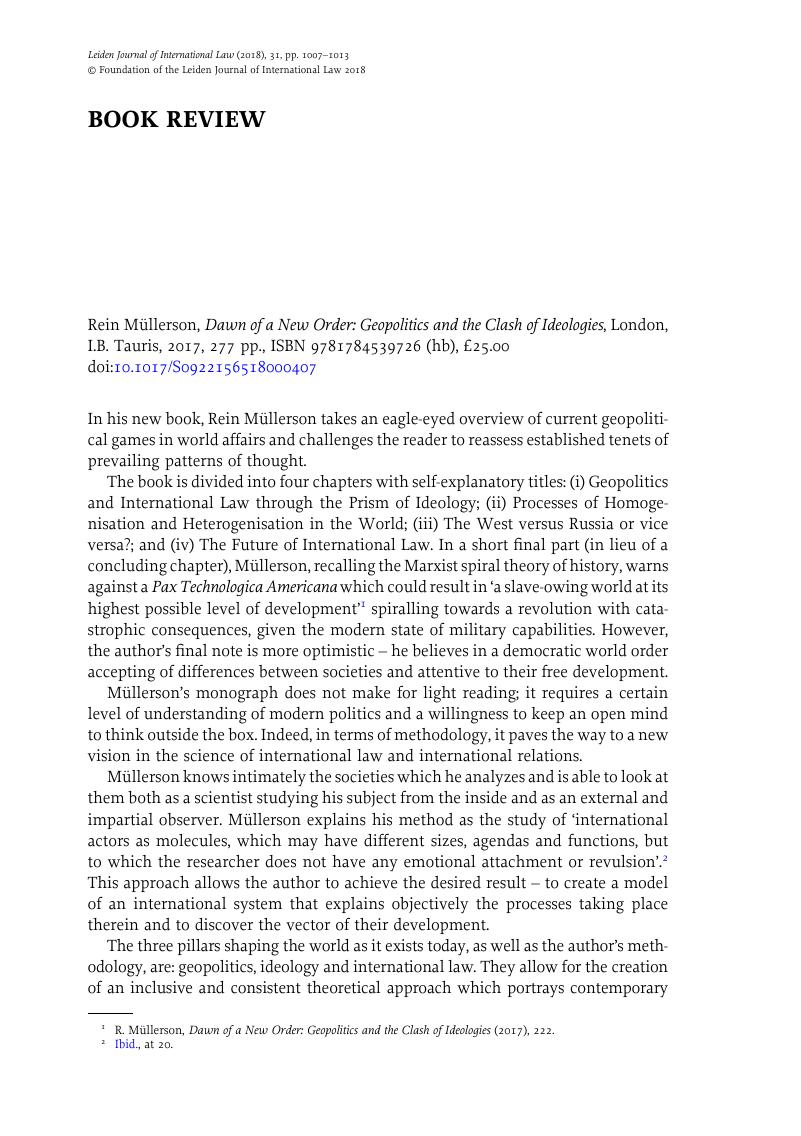No CrossRef data available.
Article contents
Rein Müllerson, Dawn of a New Order: Geopolitics and the Clash of Ideologies, London, I.B. Tauris, 2017, 277 pp., ISBN 9781784539726 (hb), £25.00
Published online by Cambridge University Press: 05 September 2018
Abstract

- Type
- BOOK REVIEW
- Information
- Copyright
- © Foundation of the Leiden Journal of International Law 2018
Footnotes
Principal Legal Secretary of the Court, Head of the Department of Legal Matters, Registry, International Court of Justice [[email protected]].
References
1 Müllerson, R., Dawn of a New Order: Geopolitics and the Clash of Ideologies (2017), 222Google Scholar.
2 Ibid., at 20.
3 Ibid., at 43.
4 Ibid., at 153.
5 Ibid., at 158.
6 In the sense that, as with the creation of the customary rules of international law, states have to recognize that the maintenance of a healthy pattern of interaction is impossible without a particular modus operandi. In this regard, Müllerson gives examples of the ‘elements of the balance [of powers]’ which were ‘enshrined in legal documents’ such as the Utrecht (1713) and Vienna (1815) Peace Treaties and the United Nations Charter (1945).
7 Müllerson, supra note 1, at 174.
8 Ibid.
9 Ibid., at 184.
10 Ibid.
11 Ibid., at 187.
12 Ibid.
13 Consent of the state in these circumstances is not the decisive factor to determine the legality of the action.
14 Gray, C., International Law and the Use of Force (2018), 202, 210, 226–7Google Scholar; see also Proulx, V.-J., Institutionalizing State Responsibility. Global Security and UN Organs (2016), 272, 339, 343CrossRefGoogle Scholar.
15 Müllerson, supra note 1, at 199.
16 Ibid., at 200.
17 Ibid., at 201.
18 Ibid., at 201.
19 See, for example, Dugard, J., The Secession of States and Their Recognition in the Wake of Kosovo (2013), 9–222CrossRefGoogle Scholar (in particular Ch. III. Conflicting values and competing rights: self-determination and territorial integrity, at 73–121); Christakis, T., ‘Self-Determination, Territorial Integrity and Fait Accompli in the Case of Crimea’, (2015) 75 ZaöRV 75Google Scholar.
20 On this point see, for example, H. Krieger and G. Nolte, The International Rule of Law – Rise or Decline. Points of Departure, KFG Working Papers Series. No. 1, available at kfg-intlaw.de/Publications/Working_Papers/working_papers_einzel.php?ID=40, at 10–12; with reference to international human rights law see Posner, E.A., The Twilight of Human Rights Law (2014)Google Scholar.
21 Müllerson, supra note 1, at 203.
22 Ibid., at 224.
23 Ibid., at 154.
24 For example, from the perspective of international law, this is the area of study of The Berlin Potsdam Research Group ‘The International Rule of Law – Rise or Decline?’. The Group started its work in 2015 and defined its mandate as an examination ‘of the role of international law in a changing global order’. The following basic questions are on the agenda of the Group: ‘Can we, under current conditions, still observe a juridification of international relations based on a universal understanding of values, or are we seeing a tendency towards an informalization or a re-formalization of international law, or even an erosion of international legal norms? Would it be appropriate to revisit classical elements of international law in order to react to structural changes which may give rise to a more polycentric or non-polar world order? Or are we simply observing a slump in the development towards an international rule of law based on a universal understanding of values?’ (see kfg-intlaw.de/Research-Agenda/research-agenda.php?ID=1).


